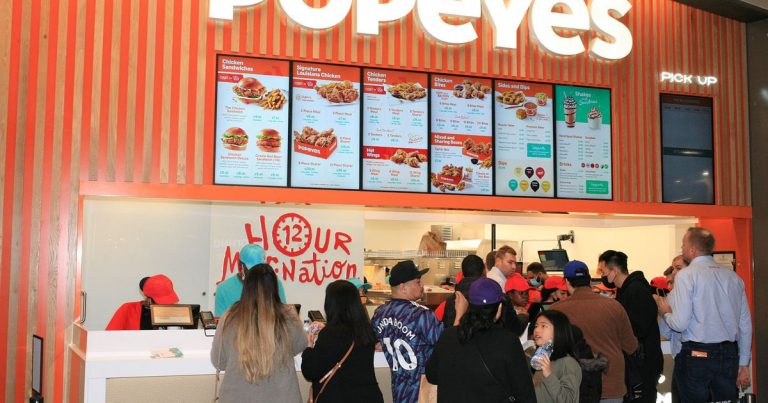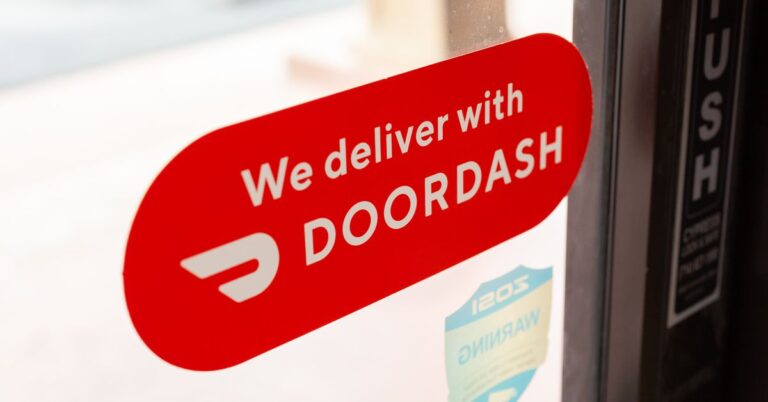Equitable Giving Circle Isn’t Just Feeding Black and Brown Portlanders. It’s Fighting for Reparations.
In a former Northeast Portland event space, tables have been cleared out in favor of produce: Stacked boxes labeled “Pablo Munoz Farms” and filled with lettuce, peppers, and rainbow chard sit on the white counter, where DeeDee Hopkins, Equitable Giving Circle’s Community Supported Agriculture (CSA) director, yanks bottles of olive oil and ground turkey out of paper bags. On the patio where people used to host cocktail hours, tables lined with gray tablecloths hold cans of peas, cheese, faux meat, and white bowls filled with apples, potatoes, and citrus. A woman wheels boxes of chard to the back of her aqua-colored car to make deliveries around the city. Among the tables, visitors browse through displays of Aardvark hot sauce bottles and bags of Heart coffee.
“If you haven’t tried Aardvark sauce, you have to try it,” Lillian Green, Equitable Giving Circle’s housing director, says to a visitor. “You know, we have a filet of salmon in the back if you’d like some.”
As Green re-enters the building to retrieve the fish, Hopkins brings a purple-hued seedling to a woman outside examining the produce. “Isn’t that beautiful, the bok choy?” Hopkins says.
Green and Hopkins are running the Equitable Giving Circle weekly pantry, a marketplace where BIPOC Portlanders can pick out groceries, plants, and toiletries to take home for free. The market, which has relocated to the Cafe Reina space on MLK and Alberta, is a barrier-free pantry, which means people who show up don’t have to prove they make below a certain income threshold, don’t need to show an ID, or have an address; the market is open to any BIPOC Portlanders. And Equitable Giving Circle’s pantries aren’t distributing salvaged food; the nonprofit is buying high-end, fresh produce and products at full price — quite deliberately — to support Black, Brown, and Indigenous producers and provide BIPOC Portlanders with the food they deserve to eat.
“We’re in the foodie capital of the world, when it comes to sauces, fruits, vegetables, meat-based alternatives,” Green says. “There’s this African proverb, ‘You’re not truly giving by giving from your last’ … We are asking people to divorce themselves from the idea that these items are ‘too good.’”
Equitable Giving Circle, a 501(c)(3) nonprofit, was founded on the idea of not just alleviating food insecurity; executive director AJ McCreary wanted to instead build a closed-loop that supported the larger BIPOC community: People would donate goods or money to the group, and that money would be used to buy from BIPOC-owned farms and purveyors. Then, those goods would be given for free to the BIPOC community, either in the form of CSA boxes filled with fresh Oregon vegetables and groceries, home deliveries, or markets like the barrier-free pantry. The EGC team also wants to tackle an even bigger project: An apartment building — or two, or more — with grocery delivery, daycare, and other amenities, whose tenants would not have to pay any sort of rent for a three-to-five-year period. The apartment building would specifically focus on housing Black single mothers.
For Equitable Giving Circle, these projects are about food sovereignty and reparations, rebuilding a world where Black and Brown Portlanders have their own spaces, their own access to capital. Food is just a part of that mission. “We’re a nonprofit centered in Black and Brown economics. Most white people are not interested in that specific work … [but] we’re a reparations organization through and through,” McCreary says. “We know, in our core, how things should operate. We’re going back to the old ways, an older value system, which is not white-centered.”
:no_upscale()/cdn.vox-cdn.com/uploads/chorus_asset/file/23200183/20211028_MollyJSmith_EaterPDX.EquitableGivingCircle.004.JPG)
Equitable Giving Circle started during the pandemic, but it’s not a program intrinsically tied to pandemic response. The CSA program is heavily influenced by the work of Booker T. Whatley, a farmer and educator out of Tuskegee University who created the foundation for community-supported agriculture. “I was at an event, and I was inspired by the idea to buy Black and Brown CSAs and distribute them,” McCreary says. She says the group raised $35,000 in its first week for its CSA program and has since raised more than $4 million in monetary and in-kind donations.
Initially, Equitable Giving Circle started with the CSA program: The group would buy CSAs from places like Pablo Munoz Farms and smaller micro-farms that rotate seasonally, and distribute them to families who signed up. During the right season, Equitable Giving Circle works with places like Portland-based Happiness Family Farm to source seasonal produce like lettuces, nightshades, and summer fruits. Each box came with around 12 to 20 pounds of seasonal fruits and vegetables; deliveries also come with grocery bags of shelf-stable items, proteins, and dairy. “That food in those boxes, if it wasn’t picked yesterday, it was picked this morning,” McCreary says. “We were just excited to work with farmers who make us healthier.”
Over time, as donations rolled in and businesses became interested in connecting with EGC, the program grew. Outreach director Dyvisha Gordon helped Equitable Giving Circle connect with similar organizations for special projects, and sends the team of volunteers out to distribute goods across the city. “We can not do our work without her,” McCreary says. “Her work is pivotal in making this all work.”
Currently, EGC’s delivery program provides Oregon produce and goods to around 300 families each week, not including the pantry program. “This food model is a circular way to support local Black and Brown businesses and intentionally oppressed community members,” McCreary says. “The positive economic impacts have been life-altering in the Portland community.”
However, Equitable Giving Circle’s scope has grown as well. In addition to Hopkins, Gordon, Green, and McCreary, the leadership board includes a number of high-profile Portland activists and business owners, including Growing Gardens home gardens director Rashae Burns, Mxm Bloc founding member Rashelle Chase, spiritual guide Nicole Burron, Soapbox Theory founder Kayin Talton-Davis, Cafe Reina owner Erica Escalante, and celebrated DJ Bianca Mack. This year, Equitable Giving Circle — in collaboration with Operation Back to School, the Black Parent Initiative, Mxm Bloc, and Tenacious Rose — filled backpacks with school supplies for 500 BIPOC students. The program distributes emergency rent or mortgage grants to families. It regularly hosts plant jams (free plants for Black and Brown Portlanders), social justice lunch-and-learns, monthly happy hour discussions and money talks, large-scale community-building events, and prepares curated boxes that support local Black-owned businesses while serving as a fundraising tool for EGC. All in all, McCreary estimates that Equitable Giving Circle has helped more than 25,000 Black and Brown people in its almost two-year tenure, and the group is far from done.
“There is a huge need, but not just around food — there needs to be a huge shift around the nonprofit model, in how we view food insecurity and philanthropy,” McCreary says. “We have big goals; we want to be in our own place. Not just in terms of service, but also to reclaim space — to build this community back.”
:no_upscale()/cdn.vox-cdn.com/uploads/chorus_asset/file/23200194/20211028_MollyJSmith_EaterPDX.EquitableGivingCircle.010.JPG)
:no_upscale()/cdn.vox-cdn.com/uploads/chorus_asset/file/23200409/20211028_MollyJSmith_EaterPDX.EquitableGivingCircle.002.JPG)
Molly J. Smith/EPDX
Lillian Green wasn’t necessarily hired at Equitable Giving Circle to help with the pantry. Green, who has worked as the equity director for the State of Oregon’s Early Learning Division and owned her own company as a diversity, equity, and inclusion consultant, grew up on North Williams — until her family was gentrified out. She doesn’t often bring up her personal history with gentrification and food insecurity, however, because for her, it shouldn’t matter.
“If one member of the community is hurting, we’re all hurting,” Green says. “Without ever having seen [poverty], we should be adamantly supporting people.”
Three of Equitable Giving Circle’s directors grew up in now-gentrified North and Northeast Portland, and all of EGC’s teams’ families have stories with problematic and predatory housing practices. The overwhelming ubiquity of housing discrimination against Black and Brown people is part of the reason EGC wanted to focus on just on food, but also housing.
While Equitable Giving Circle has consistently provided rent and mortgage assistance to Black and Brown Portlanders since its inception, and is seeking ongoing donations to do so, the goal is to build programs that would not simply slap a band-aid on a systemic issue. “We’re looking at innovative ways of redistributing wealth,” Green says. “We want people to maintain their homes. How can we be proactive about that?”
In the eyes of the Equitable Giving Circle team, the best way to build back that capital and land, to begin the rebalancing of resources within the community, is to endow Portlanders of color with ample time to do so, by eliminating as many financial or emotional stressors as possible. With the apartment building project, for example, the idea is that the residents could spend that time raising money for a down payment or whatever long-term project they’d like to pursue.
“We want to create a radical shared living space, with some of the luxuries that would allow them to grow and breathe,” Green says. “White people are benefitting from layers of privilege. When you know that housing is stable, you know childcare is available, you know that food is covered, you can set aside the time to grow.”
The space is meant to be something different from the traditional public housing model. Historically, public housing has provided populations living under a specific income level discounted rent, often with a few limited amenities — a playground, maybe, or laundry machines. But public housing developments around the country have been significantly neglected by the federal government, leaving residents in squalid and often unsafe conditions. Equitable Giving Circle wants to challenge the idea that public housing needs to be the bare minimum, that the bare minimum can be a functioning apartment building where someone won’t develop a chronic respiratory illness.
“Public housing, it has a lack of gardens, windows — the smallest possible spaces,” Green says. “We want to interrupt our relationships to space and place … It’s not how many units can we fit; it’s flipped to be about the sole comfort of the people in that space.”
Grant information is not available yet and the project is still in development. For now, however, the group is raising money for the project, distributing its boxes, and running its pantry, feeding countless Portlanders with as much good food as they can.
“People often say, at the pantry, ‘I didn’t expect this,’” Green says. “We had salmon, we had bok choy … This is a model of abundance.”





